English : Unit 7 : Prose : Cyber Safety
Warm up
In pairs, identify the types of computer. Choose and write the names from the box.
(Tablet, Palmtop computer, Laptop, Watch computer, Personal computer, Super computer)
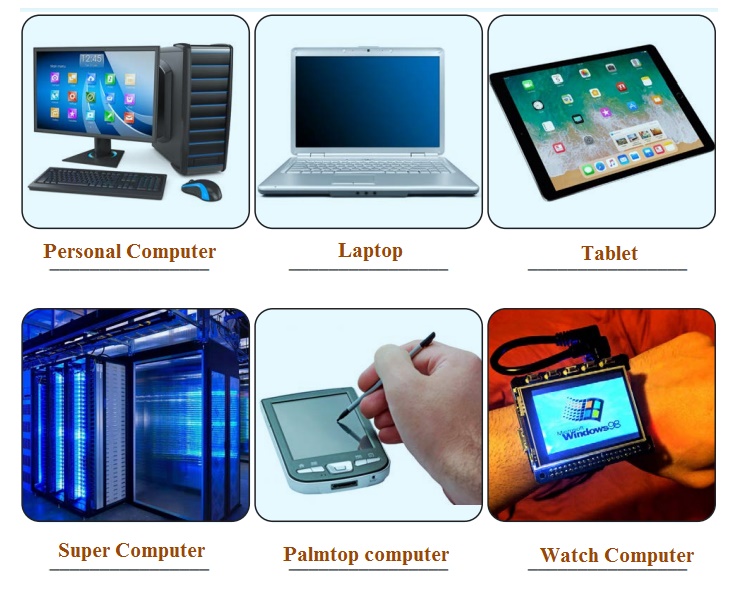
Glossary
screw guage (n) – measuring tool
browse (v) – to scan , to casually look through in order to find items of interest
frightened (v) – scared
online predator (n) – someone who sexually exploits a child over theinternet
bother (v) – to disturb or annoy
cyber (adj) – relating to or characteristic of culture of computers, information technology and virtual reality.
aggressive (adj) – prone to behave in a way that involves attacking or arguing
beneficial (adj) – helpful or good to something or someone
Questions Answers
Read and Understand
A. Choose the correct synonyms for the italicized words.
1. I was really scared.
a. bold
b. frightened
c. timid
[Answer: b. frightened]
2. Let us browse about it.
a. surf
b. read
c. glance
[Answer: a. surf ]
3. There is a chance to get addicted.
a. accustomed
b. known
c. inclined
[Answer: a. accustomed ]
4. we can’t ignore the benefits of internet.
a. favorable
b. harm
c. popularity
[Answer: a. favorable]
5. She gathered the information from the internet.
a. disburse
b. collect
c. amass
[Answer: b. collect]
B. Choose the correct antonyms for the italicized words.
1. The explosion had weakened the building’s foundations.
a. dreary
b. dull
c. strengthen
d. weak
[Answer: c. strengthen]
2. A stranger was roaming around the street.
a. well known
b. newcomer
c. unknown
d. foreigner
[Answer: a. well known]
3. Vairavan is having a spot of bother with law.
a. worry
b. annoy
c. pester
d. pleasing
[Answer: d. pleasing]
4. He asked the manager to improve the facility in the hall.
a. amenity
b. comfort
c. uneasy
d. short coming
[Answer: d. short coming]
5. A good diet is beneficial to health.
a. Benefit
b. helpful
c. harmful
d. useful
[Answer: c. harmful]
C. Fill in the blanks.
1. Internet is a great tool where, one can gather information.
2. Gladin is gathering information for his science project.
3. Childern should use internet wisely.
4. We should keep our personal details very private in the internet.
5. We should not get addicted to internet or mobile, the power house of entertainment.
D. Say true or false.
1. Gladin’s mom knew how screw guage works. [Answer: False]
2. We use internet to gather information and gain knowledge. [Answer: True]
3. Rani was frightened of an online predator. [Answer: True]
4. Strangers don’t misuse your information. [Answer: False]
5. Do not give your name, address, telephone number to the strangers. [Answer: True]
6. Too much of anything is good for nothing. [Answer: True]
E. Answer the following questions in a sentence or two.
1. Why did Gladin’s mom ask him to browse?
Answer: Gladin’s mom asked Gladin to browse to know about the working of a screw gauge.
2. Why do we use internet?
Answer: We use internet to gather information and gain knowledge.
3. What was Rani afraid of ?
Answer: Rani was afraid of a stranger chatting with her every day, using bad words.
4. What was father’s advice to Rani?
Answer: Her father advised Rani not to respond to the stranger’s message.
5. Who is an online predator?
Answer: An online predator is a person who sexually exploits a child over the internet.
6. What was father’s instruction to Gladin and Rani?
Answer: He instructed them never to chat with any unknown person. Never to share their personal details with any stranger.
7. What do strangers do with our personal information?
Answer: The strangers may use our profile and misuse our information, without our knowledge.
8. What are the benefits of computer?
Answer: The computer connects us to the internet, helps us to learn and keeps us informed. It saves time, improves our ability and keeps us entertained.
F. Answer the following in about 100 words.
1. How should one use the technology of the present world?
Answer: One should use the technology of the present world carefully and wisely. It is beneficial to all of us. But we face some negative effects, while using it Online facilities are for sharing information or knowledge among known members. We should never chat with anybody, until we know them. They could be our classmates, friends and family members, we should keep our personal details very private. Strangers may use our profile and misuse our information without our knowledge. Internet or mobile helps us to connect with people around the world. They allow us to watch various activities. But too much of anything is not good for us.
2. What happens if someone is addicted to mobile phone?
Answer: Mobile phones help us to get connected with the people around us. They allow us to watch movies, listen to music, play games and enjoy various other activities. But there is a chance to get addicted to this powerhouse of entertainment. Mobile addiction causes several serious problems such as headache, weekend eyesight and sleep disorders. We also get depressed and have a stressed life. Problems like social isolation, aggressive behaviour, financial problems and ruined relationship are also caused. Our profession is also affected by the addiction of mobiles.
3. “We can’t ignore the benefits of internet and mobile phone” Justify.
Answer: We can’t ignore the benefits of internet and mobile phones to our life, educationally and socially. They help us to connect with people around the world. They allow us to watch movies, listen to music, play games and enjoy various other activities. Internet helps us to gather information and gain knowledge, Online facilities are for sharing knowledge and information among known members. We should never chat with anybody until we know them like classmates, friends and family members. We should also limit the usage of internet and mobile phone to take charge of our lives.
ADDITIONAL QUESTIONS
Give very short answers :
1. What did Gladin want to know?
Answer: Gladin wanted to know the working of a screw gange.
2. What was the name of Gladin’s sister?
Answer: Her name was Rani.
3. Why was Gladin gathering information in the internet?
Answer: He was gathering information for his science project.
4. Does the stranger know Rani’s name?
Answer: Yes, The stranger knows Rani’s name.
5. Who advises the children?
Answer: The father advises the children.
6. What did he advise?
Answer: He advises them never to chat with strangers.
7. What does the mother request her husband?
Answer: She requested him to advise their children how to use internet wisely.
8. What are the power houses of entertainment?
Answer: Internet and the mobile are the power houses of entertainment.
9. Is too much of anything is good?
Answer: No, too much of anything is not good.
10. Can we ignore the beneficial of internet and mobile phones?
Answer: No, we can’t ignore the beneficial of internet and mobile phones.
Give short answers :
1. What is an Internet?
Answer: An Internet is a great tool where we can gather information to gain knowledge.
2. What does the stranger do?
Answer: The stranger chats with Rani everyday. He uses bad words and tells Rani not to disclose about him to anyone. Otherwise, he will cause harm to her family members.
3. How does the internet or mobile entertain us?
Answer: The internet or mobile allow us to watch movies, listen to music, play games and enjoy various other activities.
4. Why should we limit the usage of internet or mobile phone?
Answer: We should limit the usage of internet or mobile phone to take charge of our lives.
5. What personal details should be very private?
Answer: Our photos, phone number, aadhar number and our interests should be very private.
Answer in detail
1. What did Rani’s father advise her about the stranger?
Answer: Rani got scared of a stranger, who used to chat with her everyday. Rani said that he knew her name, address, age and everything. He also used bad words, while chatting with her. So her father advised her not to respond to strangers message, even if he continuously disturbed her. After some days, he might not chat, Still if he tried to disturb her, her father would take care of him. Her father would talk to his parents. So her father told Rani not to worry about the stranger anymore.
Vocabulary
British and American English
A) Find the suitable British or American English word and fill in the following.
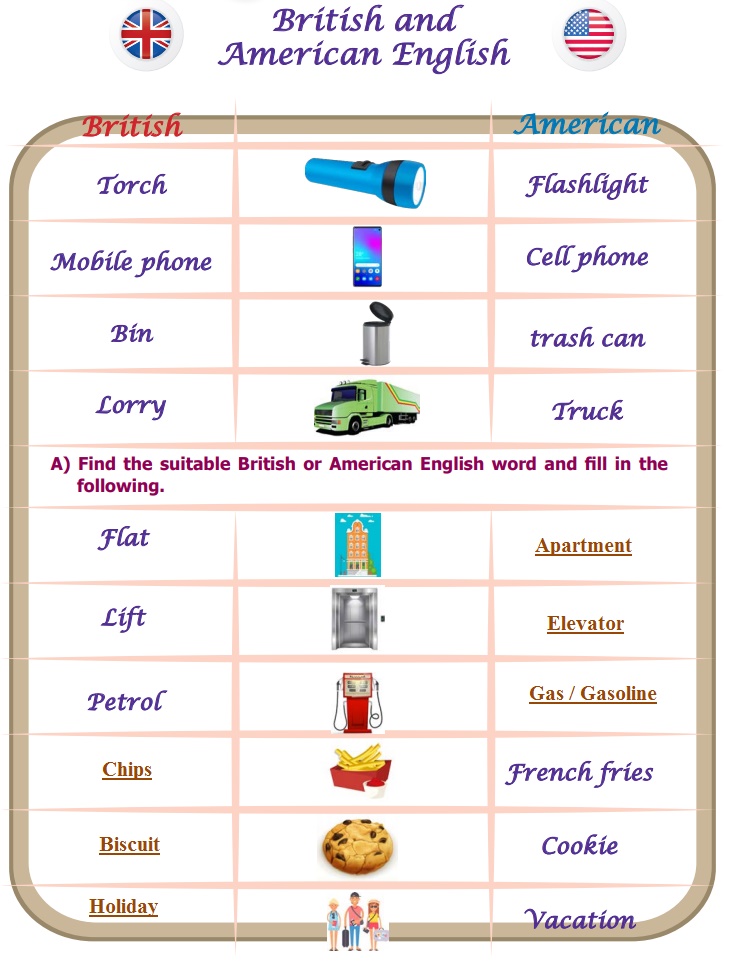
Spelling Differences
B) Find the suitable British or American English spelling and fill in the following.
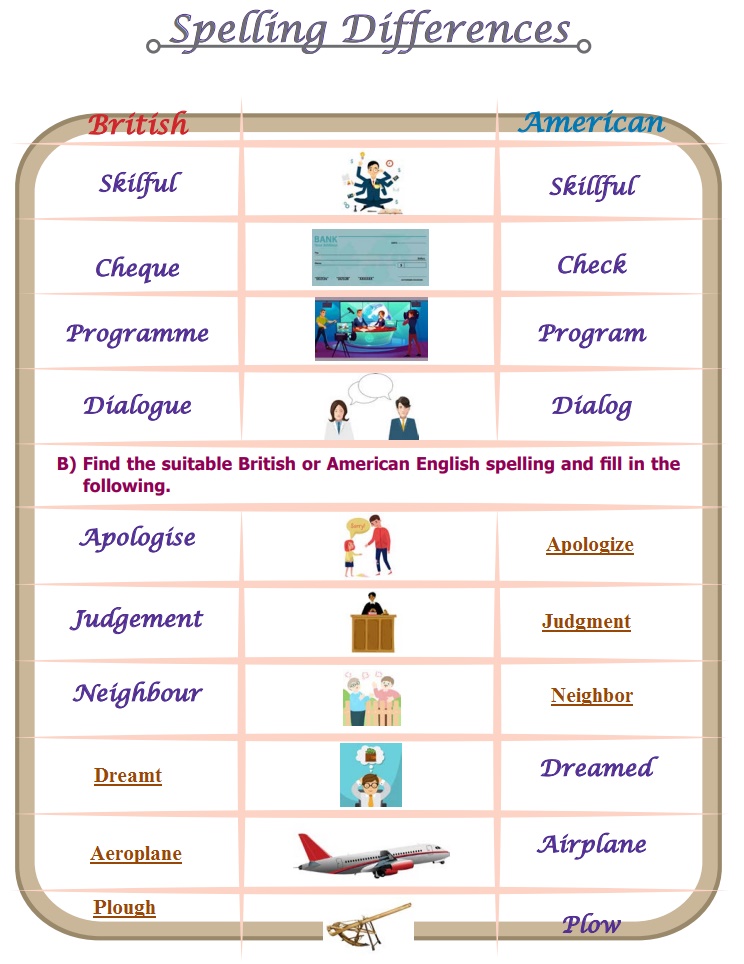
C. Eponymous Words
Words whose origin is traced to individuals are known as eponymous words.
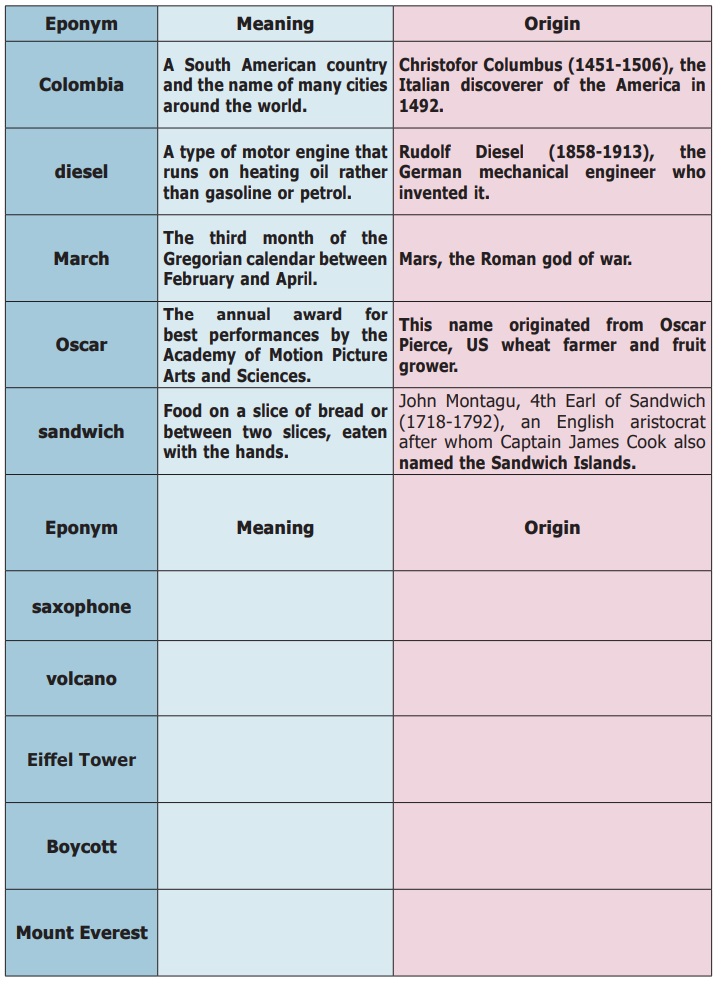
Eponym: saxophone
Meaning: A woodwind instrument made of brass and played with a single-reed mouthpiece.
Origin: Adolphe Sax, Belgian – born inventor, was the designer of the saxophone.
Eponym: volcano
Meaning: A rupture in the crust of a planetary mass object.
Origin: Vulcan, the God of fire in Roman mythology.
Eponym: Eiffel Tower
Meaning: It is a wrought-iron lattice tower on the champ de Mars in Paris, France.
Origin: Gustave Eiffel, an Engineer. His company designed and built the tower.
Eponym: Boycott
Meaning: At act of voluntary absence from using, buying or dealing with a person or organization.
Origin: Captain Charles C. Boycott, an Irish land agent:
Eponym: Mount Everest
Meaning: The world’s highest mountain above sea-level.
Origin: Sir George Everest the surveyor General of India.
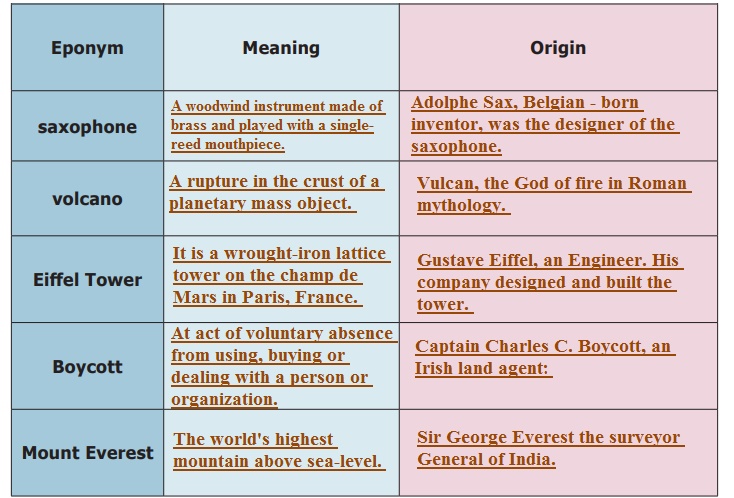
D. Euphemistic words
Using an inoffensive words in the place of an offensive words are known as Euphemistic words.
Common Euphemisms in English
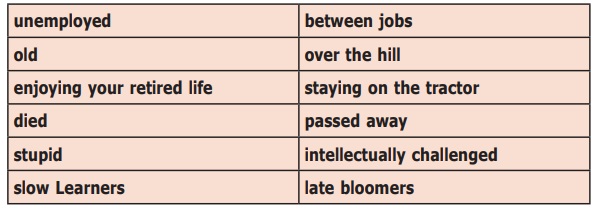
i. Fill in the blanks with correct euphemisms for the given words.

Answer:
Deaf, or hard of hearing – Hearing-impaired
mentally ill – Intellectually impaired
fat – Big-boned
blind – Visually impaired
liar – Spinning a yarn
VOCABULARY – ADDITIONAL
EPONYMOUS WORDS
An eponym refers to a person or thing after which something else is named.
Words whose origin is traced to individuals are known as eponymous words.
a. Fill in the blanks with correct Meaning and Origin for the given words.
Eponym: Atlas
Meaning: A book of maps
Origin: In Greek mythology, Atlas was the God of astronomy. He was forced to support the heavens upon his shoulders.
Eponym: Braille
Meaning: A writing system which allows blind or visually impaired people to read.
Origin: Louis Braille (1809-1852) suffered an eye injury as a small child and went blind. He developed his own writing system of raised dots.
Eponym: Celsius
Meaning: a temperature scale (0°C – 100°C)
Origin: Anders Celsius (1701-1744), a Swedish professor, developed the idea behind the temperature scale. The Celsius temperature scale was named after him.
Eponym: Fahrenheit
Meaning: One method of measuring temperature.
Origin: Gabriel Daniel Fahrenheit (1686-1736) was a German physicist. The Fahrenheit temperature scale was named after him.
EUPHEMISTIC WORDS
Euphemisms are polite, mild phrases which substitute unpleasant ways of saying something sad or uncomfortable.
Using an inoffensive words in the place of an offensive words are known as Euphemistic words.
b. Fill in the blanks with correct Euphemisms for the given words.
Word : Euphemisms
housewife : homemaker
old people : senior citizen
short : vertically challenged
prison : correctional facility
toilet : restroom
homeless : on the street
lazy : couch potato
lunatic asylums : mental institutions
Listening
E. Complete the following statements appropriately:
Internet Safety
Twenty years ago, kids in school had never even heard of the internet. Now, I’ll bet you can’t find a single person in your school who hasn’t at least heard of it. In fact, many of us use it on a regular basis and even have access to it from our homes! The ‘net’ in internet really stands for network.
A network is two or more computers connected together so that information can be shared, or sent from one computer to another.
The internet is a vast resource for all types of information. You may enjoy using it to do research for a school project, downloading your favorite songs or communicating with friends and family.
Information is accessed through web pages that companies, organizations and individuals create and post. It’s kind of like a giant bulletin board that the whole world uses! But since anyone can put anything on the internet, you also have to be careful and use your best judgment and a little commonsense.
Just because you read something on a piece of paper someone sticks on a bulletin board doesn’t mean it’s good information, or even correct, for that matter.
So you have to be sure that whoever posted the information knows what they’re talking about, especially if you’re doing research! But what if you’re just emailing people? You still have to be very careful.
If you’ve never met the person that you’re communicating with online, you could be on dangerous ground! You should never give out any personal information to someone you don’t know, not even your name!
And just like you can’t believe the information on every website out there, you can’t rely on what strangers you ‘meet’ on the internet tell you either. Just like you could makeup things about yourself to tell someone, someone else could do the same to you.
1. A mobile phone is like a world in our pockets as it is amazing.
2. Parents do not have to remain in tension if their sons and daughters are late because mobile phones can make us connected to the rest of the world within a second,
3. Some of the negative effects of a mobile phone are:
(a) headache
(b) ear ache
(c) blurring vision
(d) radiations destroy cells in ear and head
4. Excessive use of mobile phones can be hazardous to one’s health as it has negative effects.
5. A mobile phone is a threat to one’s privacy as using it as a hidden camera to take picture and making videos.
Speaking
F. Imagine a world with no books, but only e-books. How would you find such a world? Deliver a two-minute talk.
Answer:
Good Morning Friends,
Let us think of a world without books. If we live in a world of e-books, how will we find such a world? There’s no need to come to school, have teachers to teach us and there will be no punishment from our teachers. It’s wonderful! Isn’t it? E-books take up less space. You can store hundreds and thousands of E-books on your computer or reading device. They are portable. With today’s technology, you can read E-books everywhere, without worrying about their weight. They can show links, for easy access to more information and related websites.
E-books can be interactive. They contain audio, video and animations. These can enhance the message that the author is trying to convey. They also serve an important purpose in the online world from different perspectives. Smart phones, tablets, e-readers, as well as laptops and desktops can access an e-book. So let’s together opt for the wonderful world of e-books and enjoy our life. Thank you.
Writing
An electronic mail or email is used to send letters or messages using the internet. An email is usually considered more informal than a letter, but we can also use it to send a formal letter or a letter of complaint where necessary. We must use both grammar and punctuation accurately in all our emails.
Here is an example of a formal email
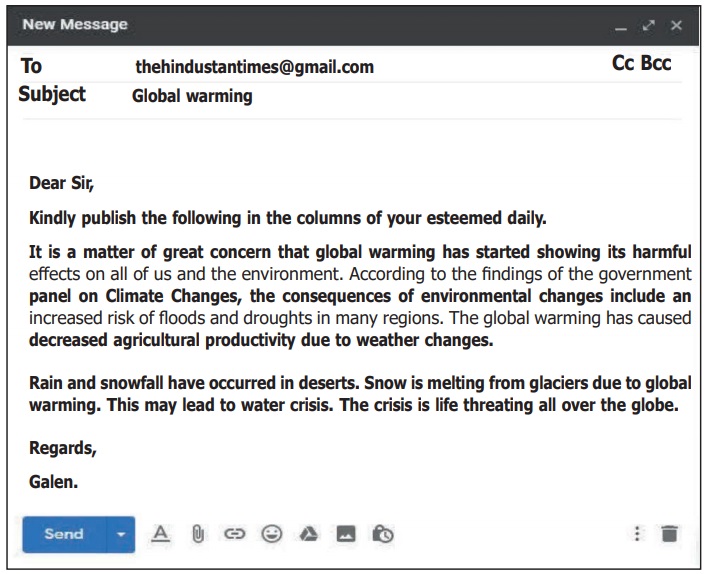
F. Write a formal email to Mr Sundar Pitchai CEO of Google, requesting him for an appointment to interview him.
Answer:
Subject: An appointment for an interview..
Dear sir,
I am working in the news channel NDTV. I would like you to spare your precious time for us. We would like to interview you. We would be happy to know all about you and your achievements in Google. If you could give us an appointment to interview you, we would be extremely happy. Kindly let us know your acceptance date and timings for this interview.
Thank you,
Regards,
Ganesh Malhotra.
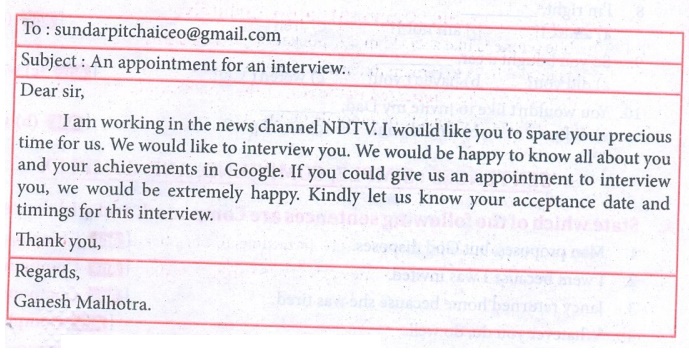
Grammar
QUESTION TAG
WHAT?
Question tags are short questions at the end of the statements.

Look at the following pictures
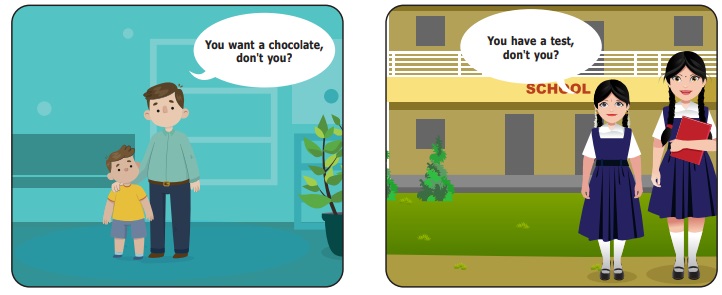
i) Father asks his son to confirm whether he wants a chocolate. He needs confirmation.
ii) Suganya asks her friend to confirm that she has a test tomorrow.
That’s how tags are used to confirm that something is true or not and to encourage a reply from the person we are speaking to.
How it formed?
Tags are formed with the auxiliary or modal verb, from the given statement with the appropriate subject (Pronoun)
Auxiliary /modal + n’t + Pronoun
Negative auxiliaries and verbs in tags are usually in the contracted form ‘n’t.
Contractions

A. Positive statement is followed by a negative question tag.

EXAMPLES
* She is a doctor, Isn’t she?
* The books are interesting, aren’t they?
* I can swim, can’t I?
* We should obey the elders, shouldn’t we?
* Once the car was costly, wasn’t it?
B. A negative statement is followed by a positive question tag.

EXAMPLES
* We don’t have enough time, do we?
* He is not playing well, is he?
* You were not listening, were you?
* Chandini hadn’t seen you before, had she?
* Children shouldn’t watch TV too much, should they?
C. If the sentence has no auxiliary verb
When the statement is in simple present, we form the question tag with do/does.

When the statement is in simple past, we form the question tag with did.


D) Statements using barely, hardly, rarely, scarcely, neither, no, nobody, none, nothing and seldom are treated as negative statement.
E) Some special cases
* He hardly works, does he?
* She rarely comes late, does she?
* They seldom speak, do they?
* He told nothing, did he?
* I am – I am a student, aren’t I?
but I am not a student, am I?
* Let’s type sentences has the tag shall we
Let’s go home, shall we?
* Affirmative Imperative has the tag will you / won’t you
Read the book, will you?
* Everyone / Everybody / nobody / somebody / anybody take plural verb in tag Everyone is perfect, aren’t they?
* Negative imperative has the tag will you
Don’t come late tomorrow, will you?
* Nothing has the tag ‘it’ in the affirmative
* This / That – These / Those have the tag isn’t it – aren’t they
This article is very good, isn’t it?
* There is / They are have the tag isn’t here – aren’t there
There are some books on the table, aren’t there?
EXERCISE
a. Fill in the blanks with suitable tags.
1. She is collecting stickers, Isn’t she?
2. We often watch TV in the afternoon, don’t we?
3. You have cleaned your bike, haven’t you?
4. John and Max don’t like maths, do they ?
5. Peter played handball yesterday, didn’t he?
6. They are going home from school, aren’t they ?
7. Mary didn’t do her homework last Monday, did she ?
8. He could have bought a new car, could’t he ?
9. Kevin will come tonight, won’t he ?
10. I’m clever, aren’t I ?
b. Fill in the blanks with suitable tags.
1. He is still sleeping, ________
a) is not he?
b) isn’t he?
c) wasn’t he?
[Answer: b) isn’t he?]
2. You go to school, ________
a) do you?
b) aren’t you?
c) don’t you?
[Answer: c) don’t you?]
3. Let’s go for a walk, ________
a) shall we?
b) shan’t we?
c) will we?
[Answer: b) shan’t we?]
4. We won’t be late, ________
a) won’t we?
b) will we?
c) are we?
[Answer: b) will we?]
5. Nobody called, ________
a) do they?
b) didn’t they?
c) did they?
[Answer: b) didn’t they?]
6. They will wash the car, ________
a) will it?
b) won’t they?
c) wouldn’t they?
[Answer: b) won’t they?]
7. We must lock the doors, ________
a) mustn’t they?
b) shouldn’t we?
c) mustn’t we?
[Answer: c) mustn’t we?]
8. I’m right, ________
a) amn’t I?
b) am not I?
c) aren’t I?
[Answer: c) aren’t I?]
9. So you bought a car, ________
a) did you?
b) haven’t you?
c) weren’t you?
[Answer: c) weren’t you?]
10. You wouldn’t like to invite my Dad, ________
a) did you?
b) would you?
c) won’t you?
[Answer: b) would you? ]
SENTENCES : SIMPLE, COMPOUND, AND COMPLEX
Simple sentence
A Simple sentence is one which has only one Subject and one Predicate.
Example:- His courage won him honour.
He must work very hard to win the first prize.
With a great effort he lifted the box.
Hearing their father’s footsteps, the boys ran away.
The man, being very hungry, ate too much.
Compound sentence
A Compound sentence is one made up of two or more Principal or Main Clauses.
Example:- The moon was bright and we could see our way.
Night came on and rain fell heavily and we all got very wet.
I shall do it now or I shall not do it at all.
He threw the stone but it missed the dog.
I both thanked him and rewarded him.
You must hurry, or you will miss the train.
Give me the book and I will read it.
I ran all the way to the station but I missed the train.
Complex Sentence
A Complex sentence consists of one Main Clause and one or more Subordinate Clauses.
Example:- They rested when evening came.
If he is at home, I shall see him.
I have found the book that I had lost.
We selected this bicycle after we had tried several times.
Once upon a time a man owned a hen which laid every day a golden egg.
The evil that men do lives after them.
A. State which of the following sentences are Compound, and which are Complex.
1. Man proposes, but God disposes. [Answer: Compound sentence]
2. I went because I was invited. [Answer: Compound sentence]
3. Jancy returned home because she was tired. [Answer: Compound sentence]
4. Whatever you do, do well. [Answer: Complex sentence]
5. Listen carefully and take notes. [Answer: Compound sentence]
6. I called him, but he gave me no answer. [Answer: Compound sentence]
7. The town in which I live is very large. [Answer: Complex sentence]
8. They always talk who never think. [Answer: Complex sentence]
9. We must eat to live, but we should not live to eat. [Answer: Compound sentence]
10. Govern your passions or they will govern you. [Answer: Compound sentence]
GRAMMAR-ADDITIONAL
SIMPLE, COMPOUND, AND COMPLEX
A. State which of the following sentences are simple, compound, complex :
1. The baby cried for food.
[Answer: Simple sentence]
2. They spoke to him in Spanish, but he responded in English.
[Answer: Compound sentence]
3. Hearing their cries, we came out.
[Answer: Simple sentence]
4. They ate too much yesterday.
[Answer: Simple sentence]
5. As we won the match, we were appreciated by the committee.
[Answer: Complex sentence,]
6. He was poor but helped everyone.
[Answer: Compound sentence]
7. After reaching home, he rang to his friend.
[Answer: Complex sentence,]
8. Open the door and close the windows.
[Answer: Compound sentence]
9. He was the man who met us yesterday.
[Answer: Complex sentence,]
10. You must hurry or you will be late to school.
[Answer: Compound sentence]
Language Check Point
1. Incorrect: Every of the two boys will get a prize.
correct: Each of the two boys will get a prize.
reason: Each is used in speaking of two or more things, every is used only in speaking of more than two.
2. Incorrect: Ten candidates have passed one failed.
correct: Ten candidates have passed one has failed.
reason: When there is only one auxiliary to two principal Verbs it should be correctly associated with the both.
3. Incorrect: Have you bought some mangoes?
correct: Have you bought any mangoes?
reason: To express quantity or degree some is used in affirmative sentences, any in negative or interrogative sentences.















Question tag answers wrer incorrect
Please give us crt ans